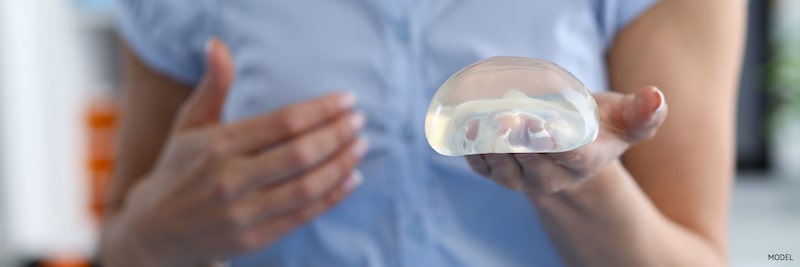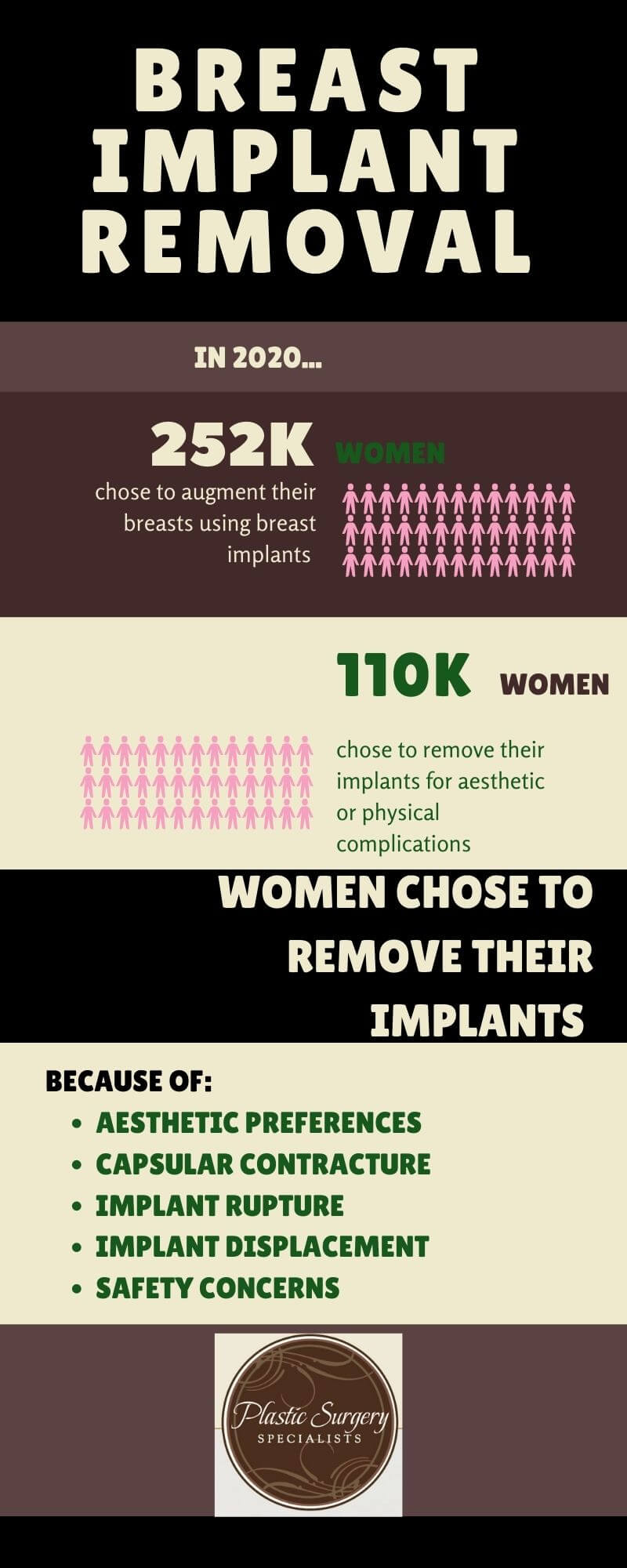4 Minute Read:
While many women are very happy with breast implants, breast implant removal isn’t uncommon. In fact, breast revision (removal or replacement) was in the top 5 of most commonly performed plastic surgeries in 2020 — with over 100,000 performed in the United States alone.
Breast implant removal may be necessary — or chosen — because of aesthetic preferences or physical complications.

Why Would a Woman Want to Remove the Implants She Chose?
Breast implant removal or replacement for aesthetic reasons is very common among women of all ages.
Many women choose to get their breasts augmented in early adulthood to enhance naturally small breasts or counteract the effects of pregnancy and breastfeeding.
These are both great reasons for considering breast augmentation; however, there are many variables to this decision.
First, it is easy to say a statement like, “I want fuller breasts,” or “I want more cleavage.” It is a lot harder to choose implants to reach those goals.
Your plastic surgeon will guide you to the implants they believe will best meet what you are describing, and, a lot of the time, those recommendations will match your desires perfectly.
However, there is no guarantee of that.
Secondly, your breasts change as you age and experience life events like pregnancy, menopause, or significant weight fluctuation. These events can impact the size and look of your breasts, altering the way you see your implants.
Breast implant removal or replacement is available for women who identify with any of the above statements.
 What Complications Require Implant Removal?
What Complications Require Implant Removal?
Implants typically last approximately 10 to 15 years, although this is not a hard-and-fast rule.
A common reason for breast implant removal is the development of a physical complication.
The most common implant complications include:
- Implant rupture
- Implant displacement/shifting (including symmastia, double bubble deformity, lateral displacement, and bottoming out)
- Capsular contraction
Implant Ruptures
Silicone in implants is nontoxic (as is saline), but ruptured silicone implants may cause discomfort, pain, or infection. The gel is form stable, which means leaks may not be noticeable.
An MRI or ultrasound verifies the condition of existing implants and identifies ruptures. We order these scans to evaluate suspected implant rupture or surveillance of devices approaching 10 or more years post implantation.
Saline ruptures are often very noticeable as the body absorbs the saline very quickly after a break. This saline is sterile and non-harmful.
Implant Displacement
Some breast implants migrate or shift out of place. This can happen if implants are too large or an injury occurs, among other reasons.
Sometimes implants shift due to aging and gravity. Surgeons address implant migration with replacement implants and breast revision procedures to adjust implant pockets.
Capsular Contracture
A capsule composed of fibrous scar tissue forms around breast implants. Capsular contracture occurs when scar tissue tightens and distorts breast shape.
This can also cause significant discomfort.
Do I Need a Capsulectomy?
Often, breast implants can be removed from the pocket and the pocket stitched up (in cases of implant removal without replacement). However, some women also need the removal of the tissue capsule.
Surgeons remove the scar tissue with a technique known as a capsulectomy. This is required in cases of capsular contracture where the scar tissue is causing the problem.
Surgeons use the en bloc capsulectomy technique (where implants and scar tissue are removed in one piece) to remove ruptured implants. This helps prevent silicone contamination during explantation.
This technique can also be used for capsular contracture and many other implant complications.
How Is BIA-ALCL Related to Breast Implants?
A very rare type of lymphatic cancer known as breast implant-associated anaplastic large-cell lymphoma (BIA-ALCL) has been associated with specific types of textured breast implants not commonly used in the United States by most surgeons. The risk of BIA-ALCL with smooth implants, as we would use exclusively, is near zero, with no cases reported worldwide in patients with smooth shell implants.
While this is very rare, some women choose to error on the side of caution and remove their implants. The FDA does not recommend removing asymptomatic implants; however, it is your choice.
What Is Breast Implant Illness?
Sometimes women choose implant removal due to a widely speculated condition called breast implant illness (BII). While not a true actual medical diagnosis, many women are claiming symptoms including hair loss, fevers, anxiety, depression, or chest pain.
The medical literature does not currently support the existence of “breast implant illness” nor have a mechanism that could explain a causal relationship to the symptoms that some people experience with breast implants in. Regardless, women can always choose implant removal if they feel like they are experiencing problems.
What Are My Options After Breast Implant Removal?
Implants can be removed without any additional procedure; however, many women choose to combine their implant removal with another breast enhancement technique.
A breast lift is commonly combined to reshape breast tissue, remove loose skin, and alter breast shape. This is often beneficial when removing large implants or older implants that may have weakened the breast tissue.
How Do I Find Breast Implant Surgeons Near Me?
Plastic Surgery Specialists of Birmingham can address any concerns you may have and help you choose the best option for breast implant removal. Call 205-298-8660 to schedule an appointment or fill out the contact form to ask questions or request a consultation.
